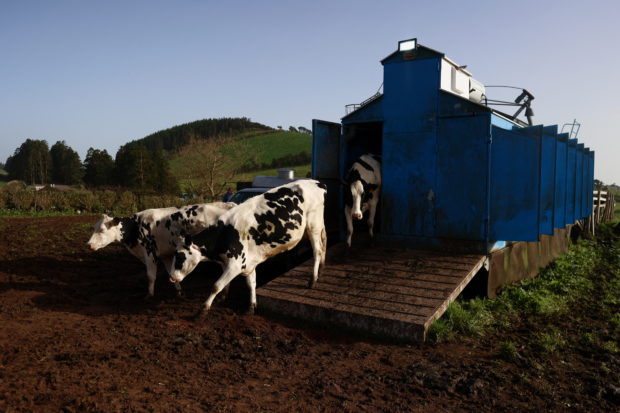
Cows leave from a mechanical milking facility, near Velas, on Sao Jorge Island, Azores, Portugal, March 28, 2022. REUTERS/Pedro Nunes
SAO JORGE, Portugal — Covered in lush green pastures, Portugal’s mid-Atlantic Azores archipelago is a cows’ paradise. But the thousands of small earthquakes that have been rattling the volcanic island of Sao Jorge in recent days are leaving dairy farmers on edge.
Grazing cows can be spotted in every corner of Sao Jorge, where the making of traditional raw milk cheese is the main source of income for many families. Milk production represents 70-80% of the island’s economy.
But Sao Jorge’s 211 dairy farmers are scared of the impact the more than 14,000 earthquakes that have hit the island since March 19 might have on their cattle and pastures, as well as on their pockets.
There are fears the tremors, which have reached a magnitude of up to 3.3, could herald a volcanic eruption for the first time since 1808, or a powerful earthquake.
CIVISA seismo-volcanic surveillance center raised the island’s volcanic alert last week to Level 4, on a scale of 5, meaning there is a “real possibility” the volcano could erupt.
With his boots covered in mud, farmer Rui Bettencourt worked tirelessly through the day to milk his more than 200 cows, and barely had time to think about what has been described as a “seismic crisis”.
“There are earthquakes but we have to go out every day,” the 47-year-old said as his cows wandered behind him. “We can’t abandon the animals.”
Nearby at a cheese production unit where Bettencourt sells his milk, factory president Antonio Aguiar said farmers would be the last to leave the island if natural disaster unfolds.
‘Walk off’
“They (farmers) continue to work because this is where they earn their income,” said Aguiar, head of Uniqueijos.
Out of fear, 1,500 of the island’s around 8,400 inhabitants have already left by sea or air, authorities have said.
Minor staff shortages have already affected Sao Jorge’s three cheese factories, including Uniqueijos, because some workers have left the island.
If the situation worsens, there are fears factories might not have enough staff to process milk. That means less money for farmers.
Azores’ agriculture secretary said on Monday the government would financially support farmers struggling to sell milk.
Bettencourt is also worried about the impact ashes from a volcanic eruption could have on his 70 hectares (173 acres) of farmland.
Farmers in Portugal and elsewhere are already struggling with rising costs of fuel and animal feed in part due to Russian’s invasion of Ukraine. A natural disaster would make things even tougher, said Aguiar.
Aguiar said he has also heard from farmers that cows are showing signs of restlessness as the tremors continue. Azores’ government said it would move cattle to safe areas if needed.
After he dropped off a tank full of milk at Uniqueijos, dairy farmer Antonio Jorge, 40, said he was a “bit afraid”.
“But I’m not going to turn my back on what I have here and walk off the island,” he said.
RELATED STORY:
Portuguese volcanic island hit by multiple quakes draws up evacuation plan